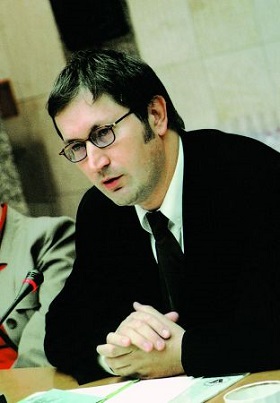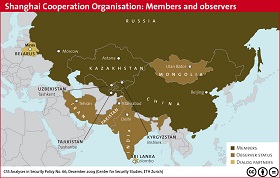SCO Summit: Agenda and Outlook
(no votes) |
(0 votes) |
Many experts point to the growing role of the Shanghai Cooperation Organization (SCO) as an indication that it has become the main political instrument for Central Asian states, although it also receives a lot of criticism. On the eve of the September 13, SCO summit in Bishkek, we are talking to Dr. Andrey Karneyev, Deputy Director of the Institute for Asian and African Studies at Moscow State University, about the organization's role in international relations and the decisions expected to be made at the upcoming forum.
Many experts point to the growing role of the Shanghai Cooperation Organization (SCO) as an indication that it has become the main political instrument for Central Asian states, although it also receives a lot of criticism. On the eve of the September 13, SCO summit in Bishkek, we are talking to Dr. Andrey Karneyev, Deputy Director of the Institute for Asian and African Studies at Moscow State University, about the organization's role in international relations and the decisions expected to be made at the upcoming forum.
Dr. Karneyev, how do you see the role of the SCO in international relations?
An objective assessment of the SCO requires a balance of expectations and conclusions, without applying any excessive demands to it. The SCO is a relatively young international organization comprising states that have vastly disparate potentials. To some extent, the body forms a platform for the discussion of some of the key issues in international development and for producing a consensus on some of the most difficult matters concerning the governments involved. The SCO, as a group, attracts many countries in Asia and in other regions, and it is proving its growing significance as a club comprising states cognizant of their responsibility for maintaining peace, stability and security in the so-called “Greater Central Asia” area. In addition, the SCO is one of the few international bodies free of any influence from the United States or other Western partners. The SCO has good prospects for the further integration of participating countries’ resources, but in terms of economic collaboration, it has yet to succeed in working out how to get a large number of projects off the ground – which would underpin political and military cooperation with dynamic economic cooperation. Numerous summits, congresses and conferences, as well as a high level of activity among top officials without adequate support at the business and popular levels is definitely the biggest flaw, while some experts believe that, to an extent, the SCO duplicates the functions of the Collective Security Treaty Organization (CSTO) and Eurasian Economic Community (EurAsEC).
Great hopes are pinned on the multilateral project to train personnel for SCO institutions and programs. It includes the SCO University established by Russia several years ago to galvanize the organization's projects through access to specialized personnel and more regional experts, as well as through promoting the group's activities in the academic community. The idea was supported by other member states, which has led to it becoming a network university, i.e. a network for interaction and student exchange between existing institutions. The University brings together about 60 higher education establishments in member countries offering education in several areas in higher professional education. I think this is an example of a project that should have seen more preparatory work done before it was launched. It is also marred by problems that exist in the broader SCO: red tape, gigantomania, haste, inconsistency, and poor use of expertise and grassroots initiative. The Russian Ministry for Education and Science could have looked more closely at Chinese practices. Since Deng Xiaoping, China has been introducing innovations through limited experiments in order to accumulate the know-how and “upscale” to larger programs. The SCO University should have been based on a compact but effective analytical “institute for SCO problems” that could have gradually grown into something bigger, with more experts and expertise emerging for the purpose.
At the same time, the SCO should not be underestimated. I think it is in Russia’s interests to preserve and advance the mechanism for dialogue within this framework. The SCO is a key mechanism for coordinating the interests of Russia, China, Central Asian states and the countries of the Caucasus on regional and now broader international issues. We need this mechanism. It means that Russia can rely on the authority of an international organization, and on the joint positions of a whole series of countries. The SCO is still a body that many countries would like to partner with or join.
There is a lot of untapped potential in the SCO. Many other groups, such as ASEAN, needed decades to smooth over their differences and find commonalities for cooperation. We can see that, in some ways, ASEAN is more advanced than the SCO, which is why the SCO should learn from the experience of other regional organizations: and this is exactly what it is already doing.
There is no point viewing the SCO as a magic wand able to solve Russia's problems in the region. For example, the SCO does nothing to regulate the flow of migrant workers from Central Asia to Russia, raise their level of training and education (awareness of the law), which is a very important issue in the Russian domestic context. In fact, the SCO is not exactly designed for this function because it was set up for other things. So there is little point in over-dramatizing the situation: Russia simply needs to quietly, persistently, and methodically pursue its interests along the chosen track, within the SCO.
What issues do you expect to be discussed at the Bishkek summit?
It has taken a long time to produce the agenda. A working meeting was held in Kyrgyzstan in July 2013, and SCO foreign ministers met in Cholpan-Ata on July 13 to agree the agenda.
There are several documents to be discussed, including the Bishkek Declaration that would reflect the consensus of SCO member states on a number of regional and international issues including the situation in Central Asia and the Asia Pacific region.
The issue of Afghanistan is sure to be covered, as the coalition is going to start to withdraw its troops in 2014. Many pundits expect a crisis to follow the drawdown. Consequently, the declaration will reflect the common approach of SCO member states to this issue.
One can assume it will also set out the approach taken to the Middle East, by SCO member countries i.e. the inadmissibility of military interference and export of the revolution.
In addition to signing the Bishkek declaration, the organization should also adopt a five-year plan on the implementation of the Treaty on Good Neighborliness, Friendship and Cooperation that was adopted in Bishkek on August 16, 2007. This is a real step forward from declarations to a concrete action plan, setting out mechanisms for its realization.
It is no secret that the SCO suffers from excessive declarations and a shortage of practical steps.
The summit should also consider a document on cooperation in science and technology and easing transport links. Transit potential is among the SCO’s main benefits. The map shows a vast area of SCO responsibility, and participating countries can facilitate the transfer of cargo and passengers from East Asia to Europe. The development of transport and communication ties can be considered one of the most promising tracks for intra-SCO cooperation.
A large number of documents should be signed at the summit. The SCO’s critics often say that too many documents are signed, with the same agenda passing from one summit to another, but that cooperation is never bolstered by real projects. Many programs remain stuck at this declarative level or in feasibility studies. One must concede that there is a grain of truth in this criticism.
What issues on the agenda are most relevant to Russia?
Quite a challenge is the Afghanistan situation. Even before the drawdown, the country poses formidable threats to Russia in terms of drug trafficking and the spread of radical Islam. If this worsens after withdrawal, the SCO will become even more relevant as a tool to counteract the threat and as a platform to identify ways to settle the crisis.
Central Asia is also a priority area. First, these countries are historically linked to Russia. Second, they have a huge Russian-speaking diaspora. Additionally, hundreds of thousands of citizens from Central Asian states come to Russia to work. Moscow is interested in the SCO becoming an instrument able to solve the whole package of problems related to Central Asia.
I view the SCO as an organization that matters to Russia. We have an interest in seeing it develop as a regional and international institution that enhances stability in Central Asia, since the situation in Russia's southern territories to a great extent depends on this.
The summit is to be attended by Iran’s recently elected President Rouhani, who is expected to meet with President Putin on the sidelines. Does this mean Tehran is expanding its participation in SCO activities or aspiring to permanent membership?
This will not be the first time that the Iranian president has attended the SCO summit. In contrast to his predecessor Ahmadinejad, known for his harsh statements - including toward the United States, Mr. Rouhani, who was recently elected President of Iran, is known as a moderate politician.
So, with the coming to power of this new President, experts predict Iran will follow calm, pragmatic policies. In response, the SCO would like to see closer interaction with Tehran.
However, this does not automatically lead to Iran's permanent membership because, as is well known, some SCO participants do not want to see any rapid expansion of the SCO. Member states are likely to suggest solving intra-organizational problems first, i.e. making it more stable and effective, before admitting new members.
India and Pakistan could also join the SCO, but this would involve numerous complicated geopolitical issues, with no easy solutions in the offing.
What do you think will China strive for at the summit? Is there any kind of rivalry between Moscow and Beijing within the group?
Some analysts maintain that Russia and China compete for influence in the SCO, with certain Western experts confident that China was more active in establishing the SCO than Russia or other member states.
However, China and Russia face the same challenges, i.e. regional insecurity, countering outbreaks of extremism and religious conflicts.
Besides, Beijing has recently been pursuing the expansion of the SCO’s scope from being one of political consensus and the discussion of security matters to a regional mechanism that has a potent economic component. As the global workshop and as a country that has colossal financial resources, China is able to advance economic projects and realize its economic interests related to energy resources and the acquisition of new markets.
Chinese projects enhance economic development of the region and alleviate numerous problems caused by the complicated ethnicity and poverty of some countries in the region.
Broadly speaking, I take a positive view of the prospects for Russia-China cooperation within the SCO, and like many other experts, I hope that this upcoming summit will be a step forward in the gradual formation of this international organization.
Interviewer: Daria Khaspekova, RIAC Program Coordinator
(no votes) |
(0 votes) |





